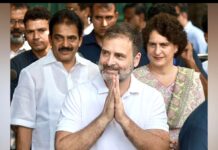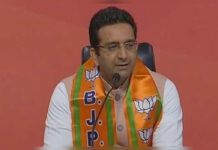The Constitutional Amendment Bill related to the One Nation, One Election proposal was introduced in the Lok Sabha on Monday following a historic first-ever e-voting in Parliament. The motion to introduce the bill was passed with a majority vote, with 269 votes in favor and 198 votes against.
Union Law Minister Arjun Ram Meghwal laid out two significant bills regarding the initiative— a Constitutional Amendment Bill and an Ordinary Bill. The introduction of the bills sparked a heated debate among lawmakers. Several opposition parties, including Congress, strongly opposed the bills, demanding that they be withdrawn.
Manish Tewari, senior Congress leader and former Union Minister, was among the fiercest critics of the bill. He argued that the proposal violated the Constitution, particularly challenging the changes it sought to make to Schedule 7. Tewari called the bill an “assault on the Constitution”, claiming it undermined the country’s federal structure and the basic principles enshrined in the Constitution. He demanded the immediate withdrawal of the bill.
In response to Tewari’s remarks, several other opposition leaders echoed similar objections. Dharmendra Yadav of the Samajwadi Party (SP), Kalyan Banerjee of the Trinamool Congress (TMC), and TR Balu of the Dravida Munnetra Kazhagam (DMK) also voiced their strong opposition to the bill. Asaduddin Owaisi, the leader of AIMIM, criticized the bill as being against the spirit of India’s federal structure and democratic values.
Despite the opposition’s criticism, the government defended the bill, stating that simultaneous elections would make the electoral process more efficient, reduce costs, and promote better governance. The introduction of the One Nation, One Election Bill is seen as a significant step toward implementing simultaneous elections for the Lok Sabha and state assemblies, a proposal that has been a subject of debate in the country for years.
The bill has now been referred to a parliamentary committee for detailed examination and further consultation before it proceeds through the legislative process. The outcome of the discussions and potential amendments will determine the future of this controversial initiative.








buying generic clomiphene without dr prescription where can i get cheap clomid price cost of cheap clomid without rx where can i get cheap clomiphene tablets can i get generic clomiphene without a prescription can i get clomid without rx how can i get clomid
Thanks for putting this up. It’s well done.
buy generic azithromycin 250mg – order azithromycin 250mg pills buy flagyl for sale
domperidone pill – purchase domperidone online cheap buy flexeril 15mg without prescription
buy amoxiclav without prescription – atbioinfo.com how to buy acillin
nexium 20mg without prescription – nexiumtous buy esomeprazole online cheap
buy generic coumadin online – coumamide buy cozaar no prescription
order meloxicam without prescription – mobo sin order meloxicam 15mg generic
over the counter erectile dysfunction pills – https://fastedtotake.com/ pills erectile dysfunction
amoxil order – amoxicillin over the counter amoxicillin tablets
forcan price – https://gpdifluca.com/# buy diflucan 200mg sale
cialis canadian purchase – ciltad gn canadian pharmacy cialis
ranitidine 300mg ca – https://aranitidine.com/# cost zantac 300mg
cialis price comparison no prescription – https://strongtadafl.com/ cialis tadalafil 20mg price
viagra buy in uk – viagra for sale birmingham sildenafil citrate tablets 100mg
Thanks recompense sharing. It’s outstrip quality. https://buyfastonl.com/furosemide.html
The vividness in this tune is exceptional. https://ursxdol.com/cenforce-100-200-mg-ed/
The depth in this serving is exceptional. generic rosuvastatin
More posts like this would bring about the blogosphere more useful. cenforce 100 livraison rapide
I am in fact thrilled to coup d’oeil at this blog posts which consists of tons of useful facts, thanks for providing such data. https://ondactone.com/spironolactone/
More articles like this would remedy the blogosphere richer.
buy warfarin sale
This is the stripe of glad I take advantage of reading. http://israelbusinessguide.com/away.php?url=https://faithful-raccoon-qpl4dn.mystrikingly.com/
Greetings! Utter useful recommendation within this article! It’s the crumb changes which will turn the largest changes. Thanks a quantity quest of sharing! http://forum.ttpforum.de/member.php?action=profile&uid=424433
buy dapagliflozin generic – janozin.com brand forxiga 10mg
orlistat for sale – https://asacostat.com/# purchase xenical without prescription
This is the big-hearted of criticism I rightly appreciate. http://zqykj.com/bbs/home.php?mod=space&uid=303420
You can conserve yourself and your stock by being alert when buying medicine online. Some druggist’s websites function legally and offer convenience, secretiveness, sell for savings and safeguards for purchasing medicines. buy in TerbinaPharmacy https://terbinafines.com/product/lopressor.html lopressor
I am in point of fact happy to glitter at this blog posts which consists of tons of useful facts, thanks representing providing such data.
Đến với J88, bạn sẽ được trải nghiệm dịch vụ cá cược chuyên nghiệp cùng hàng ngàn sự kiện khuyến mãi độc quyền.
苹果签名,苹果超级签平台,ios超级签平台ios超级签苹果企业签,苹果超级签,稳定超级签名
搭载智能站群程序,自动化搭建与管理,为SEO项目提供核心驱动力。站群程序
kuwin sở hữu kho game đa dạng từ slot đến trò chơi bài đổi thưởng, mang đến cho bạn những giây phút giải trí tuyệt vời.
Tham gia cộng đồng game thủ tại Go88 để trải nghiệm các trò chơi bài, poker phổ biến nhất hiện nay.
betmgm California online casino betmgm play betmgmnj
Ignite your evenings with fiery slots and cool bonuses. In crown coins casino, cooling-off periods promote responsible play. Play responsibly and win joyfully!
Ignite the plains with fiery spins and fortune. buffalo gold collection delivers stacked symbols, retrigger heaven, and life-changing jackpots. Your big moment is now!
Get free Sweeps Coins just for joining chumba casino free play. Enjoy Vegas-style slots with the chance to redeem real cash prizes anytime. Start spinning!